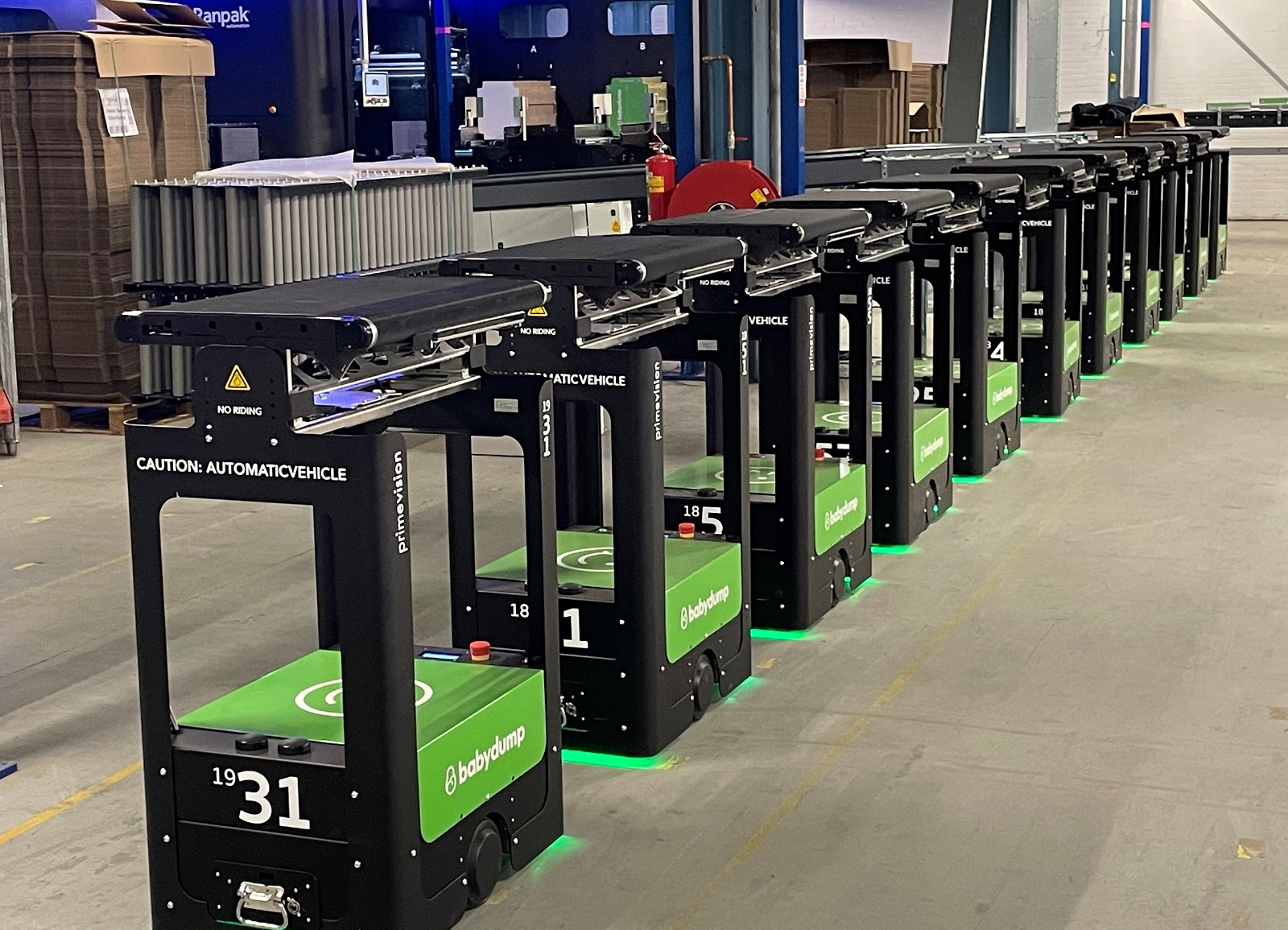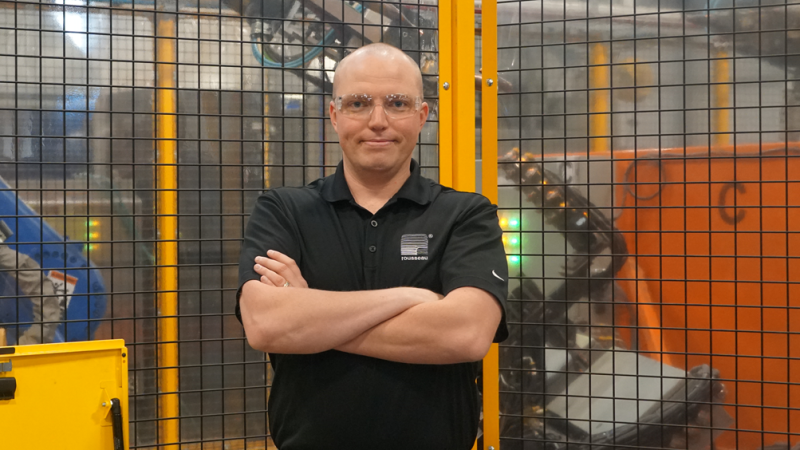To alleviate its growing pains, Babydump, a leading European retailer of baby products, automated its order picking operations at Sint-Oedenrode in the Netherlands to increase throughput and sustainability. For efficiently moving orders through the facility, it relies on 12 autonomous guided robots (AGRs) from Prime Vision.
A baby boom for business
Babydump is part of the FTH group and was founded in the 1970s as a retailer of baby products. It’s now market leader in its segment with a thriving online operation and 14 stores throughout the Netherlands and Belgium. The business offers baby rooms, prams, car seats, buggies, high chairs, baby clothing and many more baby essentials.
Experiencing rapid growth and looking to meet new environmental legislation, Babydump searched for ways to improve the efficiency and sustainability of its order picking operations. At its site in Sint-Oedenrode, online orders and stock deliveries for its stores were picked manually by employees.
Optimising picking and packaging
Having reached the limits of this set up, Babydump installed an automatic storage and retrieval system (ASRS) from Autostore to streamline the process. The ASRS holds 15,000 crates containing specific items. Instead of employees travelling along the racks, the system delivers the correct items for each order directly to a picking station, allowing workers to easily pack products.
With regards to sustainability, Babydump worked on optimising its packaging. Instead of relying on standard box sizes that rarely matched the volume of the shipment, the company purchased two box erector machines. These produce two different types of boxes, which once packed by employees at the picking station, are cut to the exact size of the order and fitted with a lid by box closing machines. This minimises wasted space and improves sustainability. The order then travels via chutes to the conveyors, which sort it for dispatch to a particular store, route or delivery service.
Robots connect the dots
However, the success of the system relied on efficiently moving boxes between all the different machines, picking stations, conveyors and chutes. There were other complications too. Beyond the ASRS, prams and other non-machinable products that can’t be handled by automation needed to be accommodated in a different process flow. Furthermore, the facility handles both online and store orders. Supporting 14 physical locations as well as e-commerce customers added more complexity. Clearly, static conveyors would be unable to accommodate these multiple demands, so a more flexible solution was required.
Following discussions with the supplier of the ASRS, Babydump approached Prime Vision to provide a fleet of 12 robots and an additional spare to support the newly automated facility. Based in the Netherlands, Prime Vision is a global supplier of automation, computer vision and robotics technology for the logistics sector. It currently operates over 700 robots at customer facilities around the world. Its local presence and industry expertise were critical advantages to Babydump.
Richard Hagen, Account Director at Prime Vision, says: “While we are used to operating fleets of up to 88 robots for sorting operations for courier and express services, the complexity of operations at Babydump presented a challenge. Our experience in this area meant that we could offer a flexible, cost-effective solution.”
Making the right moves
Prime Vision robots have a 35 kg carrying capacity and a 50 x 70cm loading surface, ready to carry a wide variety of boxes. Using light detection and ranging (LIDAR) for guidance and safety, the robots can travel without QR markers or metal on the floor. An overarching fleet management system plots the most efficient route for each robot, ensuring maximum efficiency and productivity. Smoothly travelling at between 0.8 to 1.1 m/s, Prime Vision robots quickly move items to the correct destinations.
Richard explains the setup process: “What’s important to us during implementation is the floor and what interactions will take place on it. Working with the customer, we will map out the floor in special patterns, then upload these maps to the robots so they can navigate. The other element is marking out the pick-up and drop off points such as conveyors, box machines, picking stations and chutes.
“Information from the warehouse management system tells each robot which destination to travel to, and we facilitate this with bespoke software that seamlessly communicates with the customer’s infrastructure. Any robot can drive to any destination, so they are much more flexible than conveyors. We can have the entire system up and running in less than weeks, providing quick installation and smooth processes.”
The robots have been operating at Sint-Oedenrode since the start of 2024. As well as facilitating the movement of items, the robots have the flexibility to accommodate stock orders for stores. With a battery life of over 10 hours, each robot covers multiple shifts, while the interchangeable batteries can be fully charged within 2 to 3 hours. For maintenance, Prime Vision offers remote assistance and preconfigured spare robots ready for rapid deployment to reduce downtime.
Order picking operations reborn
Since the system has gone live, Babydump has recorded a 400 to 500% improvement in the productivity of its order pickers. This increased throughput has meant the company can comfortably meet rising demand. As well as simplifying order picking for employees, it has also reduced errors and returns, saving costs, lowering emissions and improving customer satisfaction. Meanwhile, optimised packaging has saved space and materials, enhancing sustainability at Babydump. Prime Vision robots have made a significant contribution to these successes.
Richard adds: “For complex logistics processes where efficiency is paramount, robots are often the best solution, and I think the market is becoming aware of the benefits.”
Managing Director of Babydump, Henk Timmer, says: “For us, being at the forefront of innovation, continuity and sustainability is in our DNA. Prime Vision’s solution fits perfectly with that.”
Prime Vision has released a video of the robots in action, which can be viewed here.
More from Prime Vision: https://primevision.com/prime-vision-robots-help-babydump-take-first-steps-in-automated-order-picking/
Source(s):






